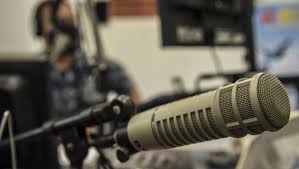
Imaging In 2018 – Melody Sharp VO
- Opinion, Radio Imaging
- Atlas Talent, Copy, Copyrighter, Imaging, Imaging in 2018, Melody Sharp, Opinion, Voiceover
- June 22, 2018

Welcome to “Imaging In 2018” a Blog Series which looks at the developments in Radio Imaging and Production, the future and opinions from across the world.
This next few sections are “Voiceovers – The Producer Relationship”

Melody Sharp
I have had the privilege and joy of working with the amazing Melody Sharp in a previous Radio Station, where she was the main Station Voice. Melody is a dream to work with and has become a friend of mine over the past few years. If you have worked with Melody before, you will know exactly what I mean.
She started as the female imaging voice in her home station,
KSLZ-FM in St. Louis, and the first station to sign her after that was 99-5 The Wolf in Dallas. Melody can currently be heard on TV and Radio Stations all across the world!
Take it away Melody. Really looking forward to this one!

1. You have voiced thousands or even millions of pieces of copy - some terrible and some not so bad. But what are the pieces that really stand out for you that ultimately end up on your Reel/Demo for marketing purposes?
2. When it comes to scripting - what would you say to the copywriter in making it easier for you to really deliver your best work. (Font size, context, providing audio, live guidance?)
3. You can write something that looks amazing but when voiced it really just doesn't work. Would you provide feedback or suggest a better way for it to be voiced?
Above all, I always want to be respectful of my place in the process. I do tend to be a little obsessive about proper grammar, however, I always read the script as it is written first. Then, I will likely give a take or 2 of how I think the line “should” read and correct the grammar mistake. There are instances once and a while where something just doesn’t flow, or the way it is written may be confusing to the listener.
I always give it my best shot as scripted, then I may include an alternate cut with my idea of an appropriate substitution. With turnaround time so fast nowadays, I usually don’t take the time to ask permission first, or have a separate dialogue about it. I just include the alternate options in the mix with the rest of the audio. That way the producer can choose on the fly and not have to take the time to get back to me with a thumbs up or down on my idea. If a change is more than anything basic, I usually note it when I email the producer and I let them know that I am ALWAYS available for a recut if they decide they want completely different wording once they start building the piece. It’s amazing how quickly you can form a relationship with your producer. I have some drastically different delivery styles that I offer and I always like to think that I sound slightly different on each station because I try to customize my sound for their particular taste. Likewise – my relationship with each producer is customized as I learn how they each prefer to work. There is nothing like getting into a good groove with a producer and having the ability to understand how they write, and how to give alternate options that you feel they would not just appreciate, but actually use. It feels great to deliver the best possible version of what they hear in their heads each time they create a new script. It’s a partnership like no other. I fell in love with radio 17 years ago and it’s the creative process amongst people I respect and appreciate, that keeps me coming back day after day.





